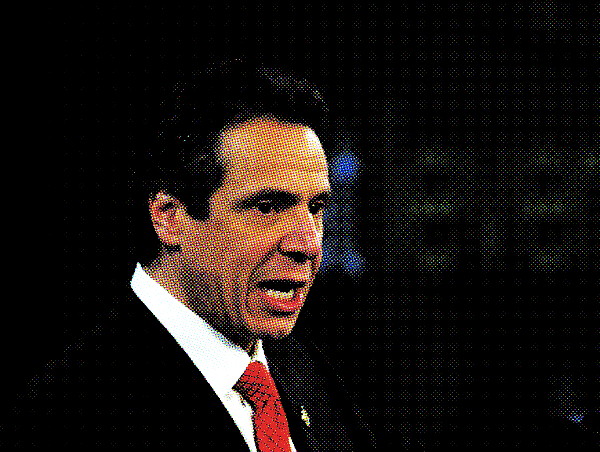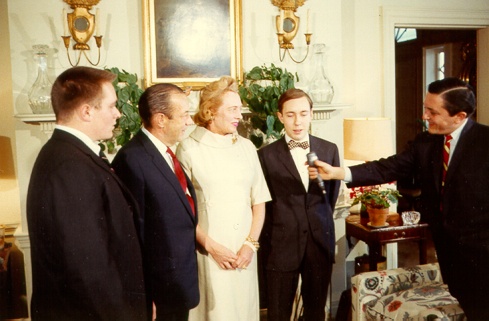Thank you, President Clinton, for your kind words. It was an honor to serve in your administration, and we’re all honored by your presence. I have to note that, over 20 years ago, when a conservative philosophy seemed dominant, you broke through – and told us to still believe in a place called Hope.
Thank you, Secretary Clinton. I was inspired by the time I spent on your first campaign. Your groundbreaking commitment to nurturing our children and families manifested itself in a phrase that is now a part of our American culture – and something we believe in deeply in this city. It Takes A Village.
Thank you, Reverend Fred Lucas Jr., Rabbi Joseph Potasnik, Monsignor Robert Romano, and Imam Askia Muhammad for your words of prayer.
Thank you, Governor Cuomo. Working with you at HUD, I saw how big ideas can overcome big obstacles. And it will be my honor to serve shoulder-to-shoulder with you again.
Thank you, Mayor Bloomberg. To say the least, you led our city through some extremely difficult times. And for that, we are all grateful. Your passion on issues such as environmental protection and public health has built a noble legacy. We pledge today to continue the great progress you made in these critically important areas.
Thank you, Mayor Dinkins, for starting us on the road to a safer city, and for always uplifting our youth – and I must say personally, for giving me my start in New York City government. You also had the wisdom to hire a strong and beautiful young woman who walked up to me one day in City Hall and changed my life forever.
Chirlane, you are my soulmate -- and my best friend. My partner in all I do. My love for you grows with each passing year. Chiara and Dante, I cannot put into words the joy and the pride that you bring your mother and me. You are the best thing that’s ever happened to us, and we love you very much.
And finally, thank you to my brothers Steve and Don, and all my family assembled today -- from all around this country, and from Italy. You have always guided and sustained me.
Thank you, my fellow New Yorkers - my brothers and sisters -- for joining Chirlane, Chiara, Dante and me on this chilly winter day.
De parte de Chirlane, Chiara, Dante y yo, les extiendo las gracias a ustedes, mis hermanas y hermanos niuyorquinos, por acompañarnos en este dia tan especial.
Like it is for so many of you, my family is my rock. Their wisdom, their compassion, and their sense of humor make each day a gift to cherish.
But, what makes today so special isn’t just my family, but our larger New York family. We see what binds all New Yorkers together: an understanding that big dreams are not a luxury reserved for a privileged few, but the animating force behind every community, in every borough.
The spark that ignites our unwavering resolve to do everything possible to ensure that every girl and boy, no matter what language they speak, what subway line they ride, what neighborhood they call home — that every child has the chance to succeed.
We recognize a city government’s first duties: to keep our neighborhoods safe; to keep our streets clean; to ensure that those who live here – and those who visit – can get where they need to go in all five boroughs. But we know that our mission reaches deeper. We are called to put an end to economic and social inequalities that threaten to unravel the city we love. And so today, we commit to a new progressive direction in New York. And that same progressive impulse has written our city’s history. It’s in our DNA.
Nearly a century ago, it was Al Smith who waged war on unsafe working conditions and child labor. It was Franklin Roosevelt and Frances Perkins who led the charge for the basic bargain of unemployment insurance and the minimum wage. It was Fiorello La Guardia who enacted the New Deal on the city level, battled the excesses of Wall Street, and championed a progressive income tax.
From Jacob Riis to Eleanor Roosevelt to Harry Belafonte — who we are honored to have with us here today — it was New Yorkers who challenged the status quo, who blazed a trail of progressive reform and political action, who took on the elite, who stood up to say that social and economic justice will start here and will start now.
It’s that tradition that inspires the work we now begin. A movement that sees the inequality crisis we face today, and resolves that it will not define our future. Now I know there are those who think that what I said during the campaign was just rhetoric, just “political talk” in the interest of getting elected. There are some who think now, as we turn to governing – well, things will continue pretty much like they always have.
So let me be clear. When I said we would take dead aim at the Tale of Two Cities, I meant it. And we will do it. I will honor the faith and trust you have placed in me. And we will give life to the hope of so many in our city. We will succeed as One City. We know this won’t be easy; It will require all that we can muster. And it won’t be accomplished only by me; It will be accomplished by all of us — those of us here today, and millions of everyday New Yorkers in every corner of our city.
You must continue to make your voices heard. You must be at the center of this debate. And our work begins now. We will expand the Paid Sick Leave law -- because no one should be forced to lose a day’s pay, or even a week’s pay, simply because illness strikes. And by this time next year, fully 300,000 additional New Yorkers will be protected by that law. We won’t wait.
We’ll do it now. We will require big developers to build more affordable housing. We’ll fight to stem the tide of hospital closures. And we’ll expand community health centers into neighborhoods in need, so that New Yorkers see our city not as the exclusive domain of the One Percent, but a place where everyday people can afford to live, work, and raise a family. We won’t wait. We’ll do it now.
We will reform a broken stop-and-frisk policy, both to protect the dignity and rights of young men of color, and to give our brave police officers the partnership they need to continue their success in driving down crime. We won’t wait. We’ll do it now.
We will ask the very wealthy to pay a little more in taxes so that we can offer full-day universal pre-K and after-school programs for every middle school student. And when we say “a little more,” we can rightly emphasize the “little.”
Those earning between $500,000 and one million dollars a year, for instance, would see their taxes increase by an average of $973 a year. That’s less than three bucks a day – about the cost of a small soy latte at your local Starbucks.
Think about it. A 5-year tax on the wealthiest among us – with every dollar dedicated to pre-K and after-school. Asking those at the top to help our kids get on the right path and stay there. That’s our mission. And on that, we will not wait. We will do it now.
Of course, I know that our progressive vision isn’t universally shared. Some on the far right continue to preach the virtue of trickle-down economics. They believe that the way to move forward is to give more to the most fortunate, and that somehow the benefits will work their way down to everyone else. They sell their approach as the path of “rugged individualism.”
But Fiorello La Guardia — the man I consider to be the greatest Mayor this city has ever known — put it best. He said: “I, too, admire the 'rugged individual,’ but no ‘rugged individual' can survive in the midst of collective starvation.”
So please remember: we do not ask more of the wealthy to punish success. We do it to create more success stories. And we do it to honor a basic truth: that a strong economy is dependent on a thriving school system. We do it to give every kid a chance to get their education off on the right foot, from the earliest age, which study after study has shown leads to greater economic success, healthier lives, and a better chance of breaking the cycle of poverty.
We do it to give peace of mind to working parents, who suffer the anxiety of not knowing whether their child is safe and supervised during those critical hours after the school day ends, but before the workday is done. And we do it because we know that we must invest in our city, in the future inventors and CEOs and teachers and scientists, so that our generation – like every generation before us – can leave this city even stronger than we found it.
Our city is no stranger to big struggles -- and no stranger to overcoming them.
New York has faced fiscal collapse, a crime epidemic, terrorist attacks, and natural disasters. But now, in our time, we face a different crisis – an inequality crisis. It’s not often the stuff of banner headlines in our daily newspapers. It’s a quiet crisis, but one no less pernicious than those that have come before.
Its urgency is read on the faces of our neighbors and their children, as families struggle to make it against increasingly long odds. To tackle a challenge this daunting, we need a dramatic new approach — rebuilding our communities from the bottom-up, from the neighborhoods up. And just like before, the world will watch as we succeed. All along the way, we will remember what makes New York, New York.
A city that fights injustice and inequality — not just because it honors our values, but because it strengthens our people. A city of five boroughs — all created equal. Black, white, Latino, Asian, gay, straight, old, young, rich, middle class, and poor. A city that remembers our responsibility to each other — our common cause — is to leave no New Yorker behind.
That’s the city that you and I believe in. It’s the city to which my grandparents were welcomed from the hills of Southern Italy, the city in which I was born, where I met the love of my life, where Chiara and Dante were raised.
It’s a place that celebrates a very simple notion: that no matter what your story is – this is your city. Our strength is derived from you. Working together, we will make this One City. And that mission — our march toward a fairer, more just, more progressive place, our march to keep the promise of New York alive for the next generation. It begins today.
Thank you, and God bless the people of New York City!












